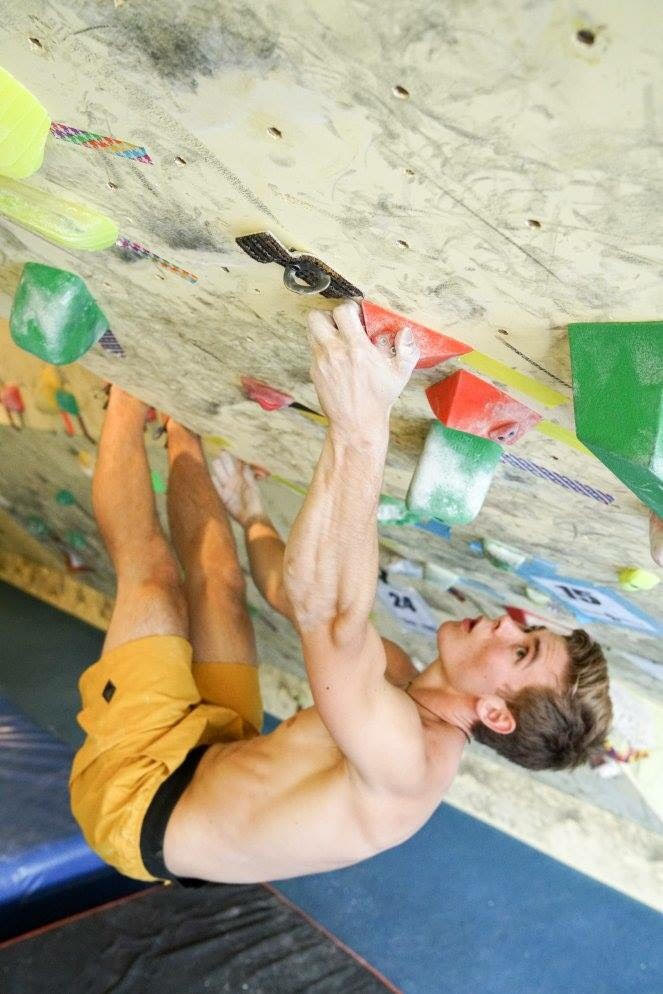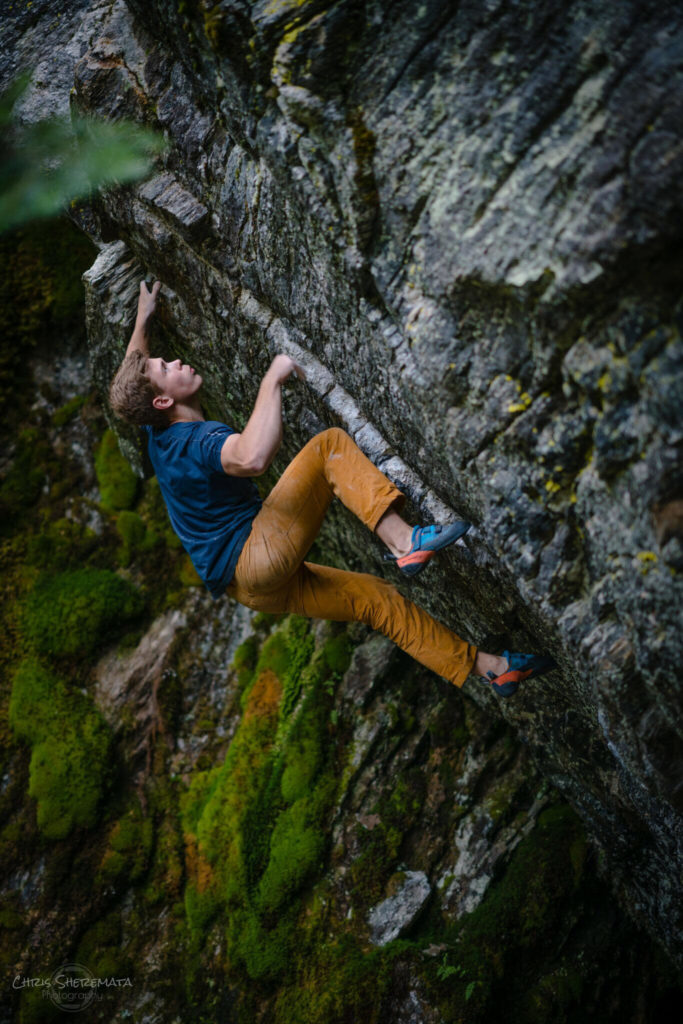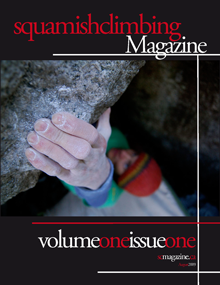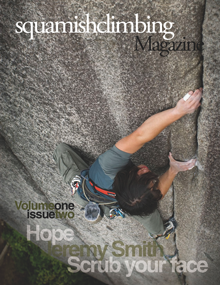This weekend, Edmonton, Alberta will play host to the 2017 Canadian Open Bouldering Championships. With all the strong competitors coming out of the woodworks to compete this year, we had a number of people who we could have interviewed before the competition. Sticking out above the rest was Edmonton-local and prairie crusher Andrew Funk. After graduating high school, Andrew took his stoke outside and travelled around Europe sport climbing in limestone paradise. After sending his first 5.14a (Mal de Isla), Andrew made his way home only to find himself back on the road. Now attending the University of British Columbia in his first year of Engineering, Andrew has found a home on the Hive Climbing team in Vancouver and has pushed himself this year under the tutelage of Jeff Thompson and Christian Core. We thought it would be awesome to check in with Andrew as he gets ready to fly home. Here is what he had to say.
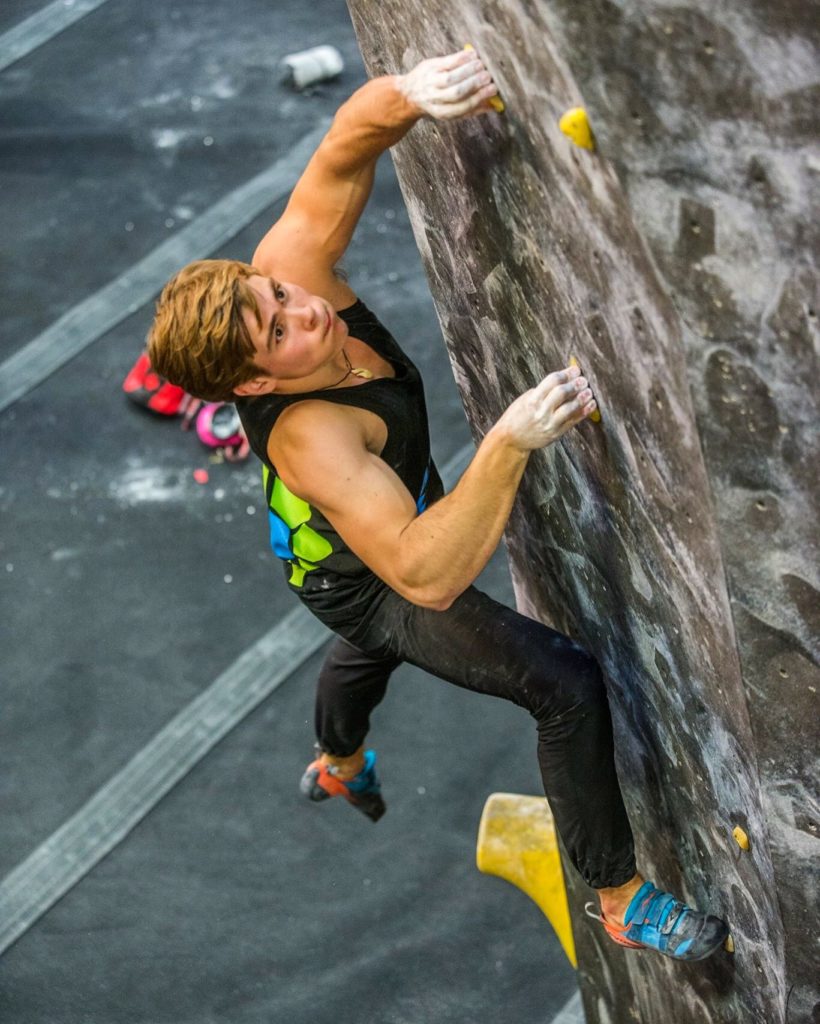
Andrew Funk. Photo by Shane Murdoch ©
Hi Andrew, first off thanks for taking the time to chat with us! How are you feeling going into Nationals?
Hey Tim, any time! I’m feeling pretty good for the most part! It’s been a pretty good first season back for me. I’ve felt like I’ve learned a lot about my comp strategy and headspace at every event so I’m looking forward to building on that this weekend. I’ve been dealing with a couple tweaky fingers over the past few weeks, so training hasn’t quite been perfect, but that really just means I need to focus on being a little bit smarter and making every attempt count.
This year is a bit special because Nationals are being held in your hometown and you get to go back and enjoy the community! What are you looking forward to the most about going back home?
The biggest thing has to be the Edmonton/Alberta Competition crew! It’s always so much fun to spend time with those guys, especially at an event like nationals when there’s already so much energy in the air.
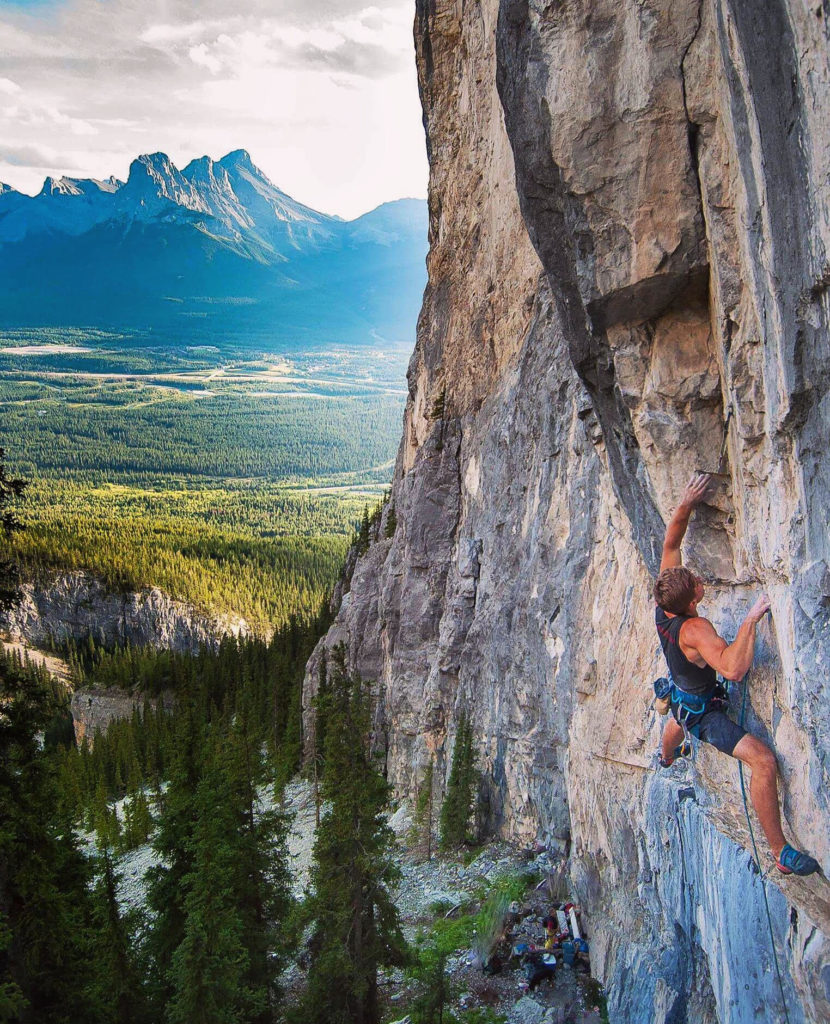
Andrew Funk high up above Canmore. Photo by Bonar McCallum ©
You grew up climbing in the Prairies. Can you tell us how it all started?
Pretty typical of most youth competitors, I was introduced to the sport through a couple of birthday parties, which lead me to doing a couple climbing-related summer camps, which introduced me to my earliest coaches who imbued their passion for the world of climbing into me right away. The rest is history!
The community in Edmonton must be tight. Where there any old school guys that influenced your ideas about climbing as you grew up?
Definitely! The first, and potentially most influential, was my first coach Marshal German. His philosophy was simply to have as much fun as you possibly could at the gym, but you had to put in the time training too. A little further down the road, I was introduced to two of the biggest names in the Edmonton climbing scene, Terry Paholek and Dan Archambault. Those two guys mentored me pretty closely throughout high school, and definitely helped show me how climbing could be a passion that lasts for a lifetime.
Terry has always been a huge competition guy in Canada. Can you tell us one thing that stuck with you from working with him?
The thing I love most about climbing with terry was his philosophy with training; that the best training for climbing is just more climbing. The amount of bizarre, convoluted sequences and movements he’d come up with really challenged me to think outside the box. Climbing with him often became brought the mental side into climbing much more than it had for me in the past, which I think has become one of my favourite aspects of the sport; learning how to visualize movements that I’d never tried before so that I was able to understand them better on the wall.
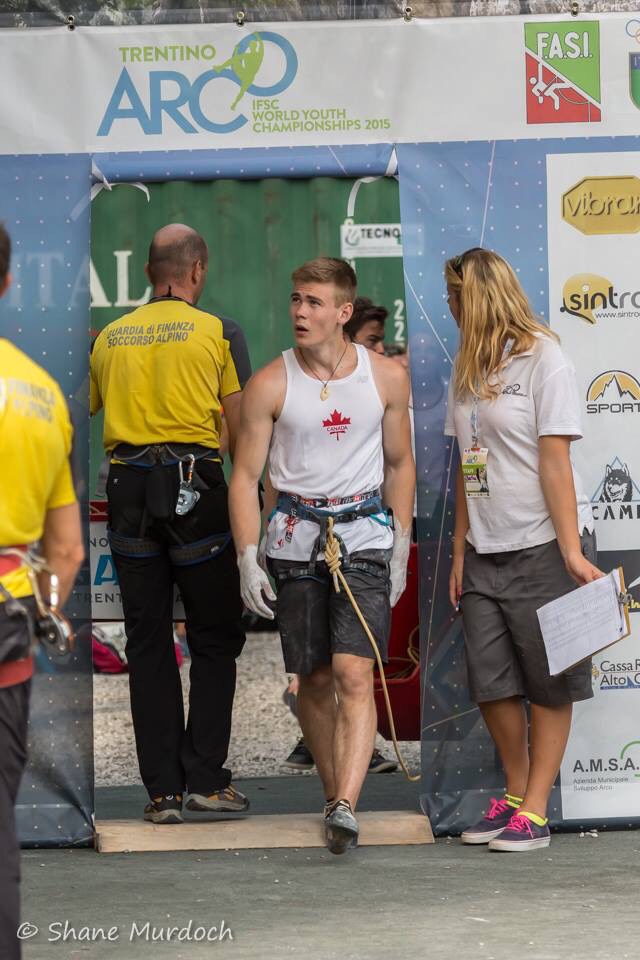
Andrew representing Canada in Arco, Italy. Photo by Shane Murdoch ©
Edmonton now has a bunch of great gyms but it wasn’t always that way. Can you tell us about the progression of climbing in Edmonton and how it has grown over the years?
Back when I was getting started, the main training gym in Edmonton was called Urban Uprising, and was in the Butterdome on the U of A campus. As the years went by, more and more money was being put into creating gyms and facilities of the highest standard. It’s been the same old-school group of Edmonton climbers who mentored me when I was young who have been slowly gaining the resources and experience to advance the sport through opening/running gyms. It’s also been these people who are training up younger climbers to take on the torch, pushing the sport in Edmonton. It’s definitely been exciting just seeing how many new faces are appearing in the gyms who absolutely crush!
You now live in Vancouver and are in your first year of engineering at UBC. How has it been living away from home and have there been any challenges along the way?
After travelling as much as I did in between high school and University, living on my own hasn’t been too big of a transition. The biggest challenge so far has been trying to balance my climbing/training ambitions with making sure I’m putting in enough time to succeed in school as well, but I’ve had an amazing support network from family, and the entire crew over at Hive Climbing to help me through it.
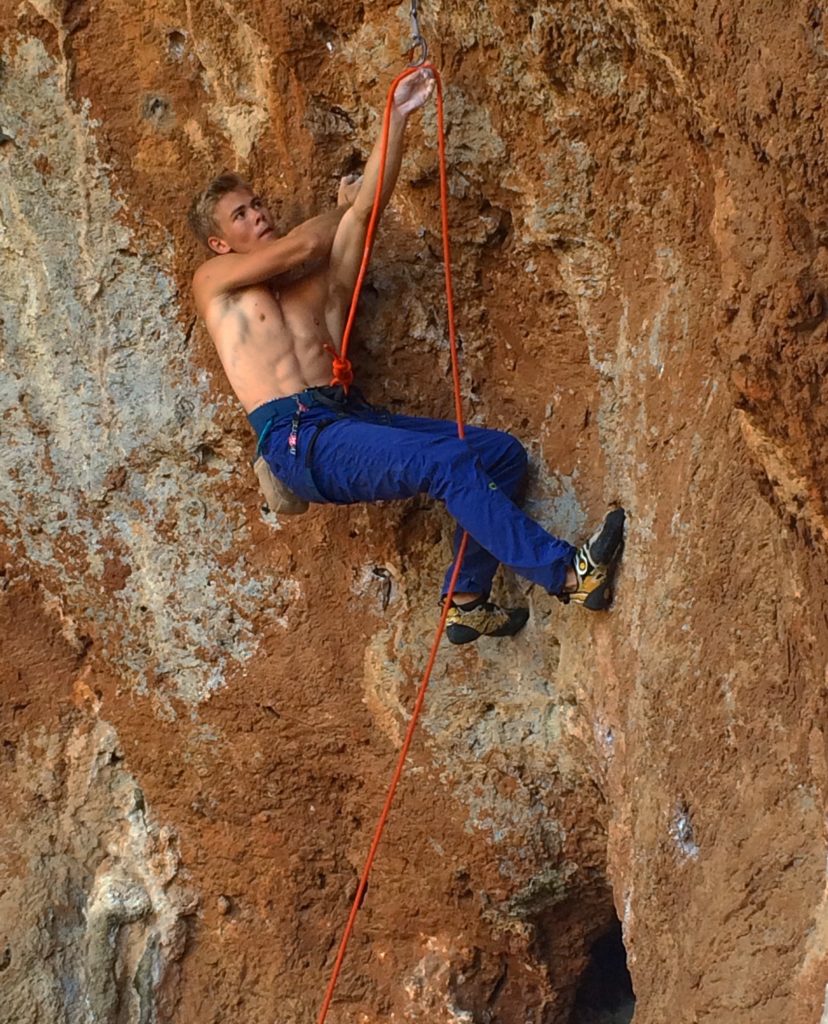
Clipping draws in Kalymnos. Photo by Sara Frangos ©
Before entering University, you took a year off to climb. Can you tell us a bit about that experience and what you took away from it all?
Probably the biggest thing I took away from it is just how diverse this sport is, and how there’s lifetimes of goals to try and work towards. After sport-climbing almost every day for close to five months, and actually achieving some of the lofty goals I had set for myself, I actually felt like my time sport climbing had come to a rather poetic end, and I was wanting to explore other areas of the sport more… so I went bouldering for three months. And then I routeset for a while and then I started sport climbing again. Now, I find myself neck-deep in stoke to be training to just try and be stronger, smarter, and better in every aspect of the sport I can think of. I just can’t imagine ever running out of things I want to try and do in this sport.
You and I spoke about the end of that trip and how climbing became a little unfulfilling. Can you tell us a bit about that revelation?
Yeah, so here’s probably a long answer for you. On the last day of my sport climbing trip in Europe, I had my world absolutely shattered when I sent my project, Mal de Isla, 5.14a. I had so much ambition, hope, and fear tied up in this route that words cannot describe how much sending it meant to me. For the first time in my climbing career I felt completely fulfilled, one hundred percent proud of myself. As someone who has always been looking towards the next goal in my climbing, it was a pretty weird feeling being content with what I had accomplished, and not knowing what the next goal would be. On a whim, I planned a bouldering trip, and went from there. Very quickly I got wrapped up in goals and projects in the world of bouldering, and I definitely have some unfulfilled objectives there. As time went on, I found myself starting to want to get back into sport climbing, wanting to try and push myself even further than I did last time. There’s definitely a couple routes floating around in my head I want to go test myself on someday. Ultimately, I never found climbing to be unfulfilling, I just needed to give myself a little bit of time to recharge from the rigours of projecting above your limit, and to learn to find joy and fulfillment in other aspects of climbing.
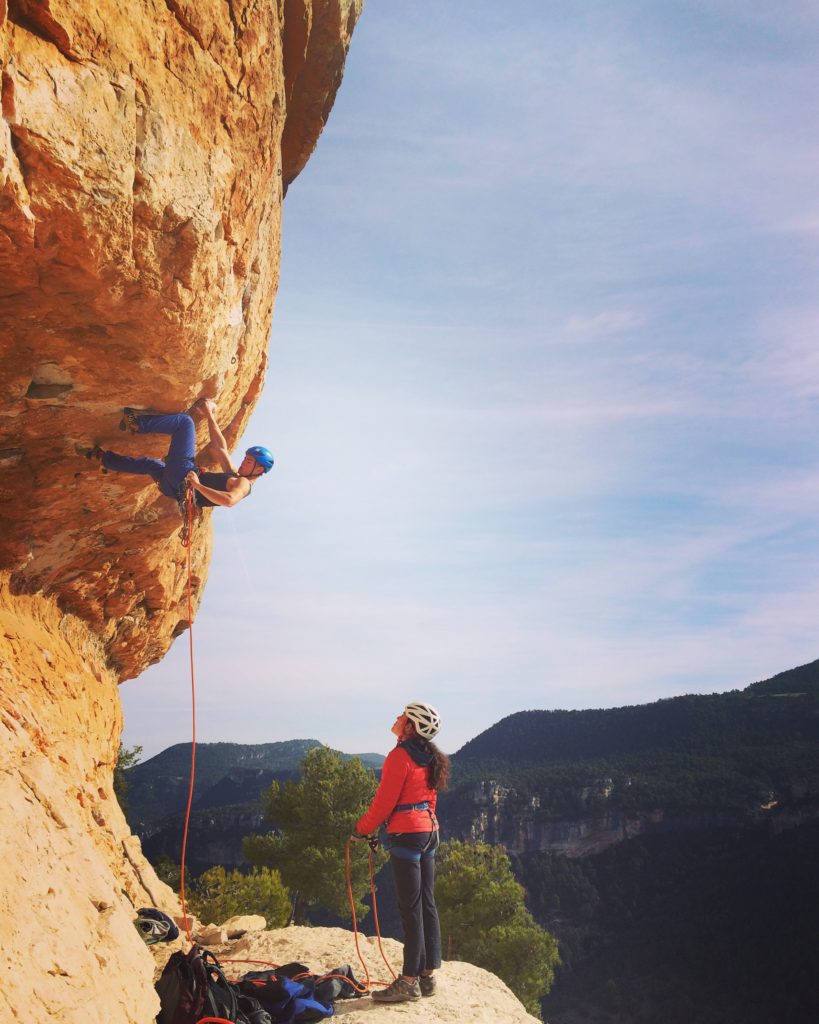
Get a stick clip, Siruana, Spain. Photo by Becca Frangos ©
This year, you have been training with the Hive team, including one your good friends Allison Vest. How has it been working with the team and what have you learned about training this year?
It’s been an incredible experience working with all of the members of the Hive team this year, as well as our two incredible coaches Jeff Thompson and Christian Core, our additional trainers and therapists, and of course the owners and managers of the Hive who have been overwhelmingly supportive and positive people in my life. With Jeff’s experience in almost all aspects of high level gymnastics training, and Christians undeniable experience in climbing, I’ve had a lot of my perspectives on training challenged this year. Something Jeff said to me recently was that, unless you are constantly on the brink of injury, you’re not doing everything you can be to be getting stronger, and that injury is just an opportunity to come back stronger. As someone who’s greatest fear is being injured, this was actually pretty helpful to hear, and really helped me keep things in perspective, knowing that one or two little things going wrong is no reason to stop working towards being a better and stronger athlete.
Balancing school and a training schedule must be difficult? Do you think it has affected your climbing at all?
I think the biggest thing that has suffered is the time I put into mobility and injury prevention. The last thing I want to do after power endurance death training or a three hour campus/hangboard sesh is to spend half an hour rolling out my back and massaging my forearms, but is definitely something I need to be more diligent with. I’m not used to the rigours that this training plan has been and I need to be better at taking care of myself in between the training sessions.
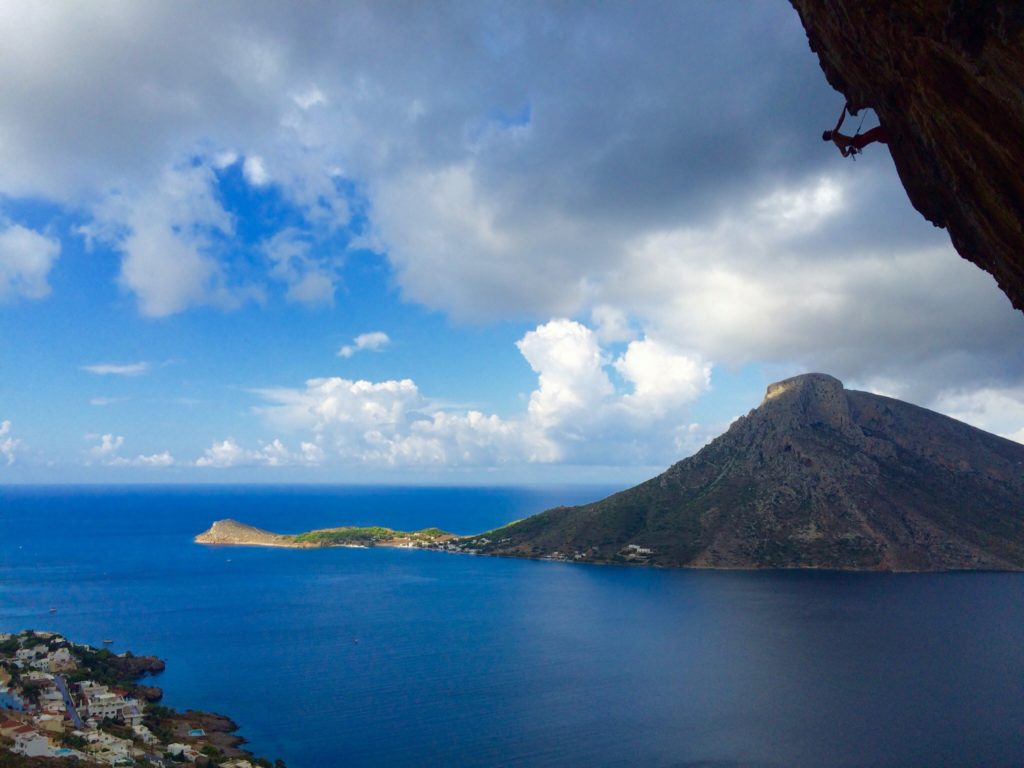
High above the Grotto. Photo by Sara Frangos ©
After this weekend, will that be it for the competition season for you and what are you looking forward to in the future?
Not too many things are clear to me with respect to my goals in climbing, but I know for a fact that I’m not really interested in rope comps or world cups this season. The biggest goal immediately after nationals will be to get my fingers back to 100%, and then to see how close rock season is. A bouldering trip down in the states could be pretty fun… and the limestone sport climbing in Canmore is pretty enticing in the summers… or doing literally anything in Squamish sounds cool if I’m in Vancouver for the summer… I guess I’m torn. Having fun on rocks sounds like a good place to start.
As you continue with competition climbing, does it have the same appeal as it did before you graduated and went on the road for a year?
Before I went on the road for a year, climbing on rocks was all I could really think about and competing was just kind of something I did to keep me training and climbing. These days, I feel like I’m taking the adult competitions a little more seriously, which definitely motivates me more. I feel much more compelled to work harder towards these competitions due to the fact that they feel more important than they used to. I’m not sure why this shift has happened, but I really feel like I have a lot more to do, see and experience on the open Canadian competition circuit.
How do you think young climbers coming out of the gym environment adapt to outdoors and what are some of the things you have learned along the way?
The biggest thing that I have learned is that you need to respect the fact that there are massive differences between climbing outside and pulling on plastic. The biggest thing that’s amazing about climbing is that a lot of the sport depends upon mentorship. In my experience, the first few times you get onto rock as a young climber is with a coach, or someone similar. My first few times climbing outside I was lucky to have coach, guru, climbing legend, and rumored ninja Dung Nguyen to teach me that the most important thing when climbing outside was respecting nature, the other climbers, and the rock. Then, you could focus on your own climbing. His approach definitely helped me learn the finer points of climbing outside, and to appreciate the process of failing and learning, failing and learning, then eventually succeeding in any endeavour, no matter how small or simple.
This season, the competition scene in BC has been tight. Can you tell us a bit about your experience and what it has been like?
It’s pretty incredible to me just how many people are so strong out here. At any competition, there’s 10-12 people who undoubtedly deserve a spot in finals. Of course, there’s only 6-8 spots in finals. From my perspective, it’s less about placements, and more about the experience of the struggle and effort in finals that’s so addictive to me. Whenever I miss a finals, I’m not gutted because I won’t find myself on the podium, I’m upset because I don’t get to climb anymore. I imagine most of the other competitors in BC are like me; the love of being in finals combined with the uncertainty of being able to qualify is just another factor to motivate our training.
How much of the comp season is about riding confidence and believing in yourself?
Believing in myself is almost always the number one thing that affects how I do in an event. I’ve gotten pretty good at controlling my headspace in competition this season, mainly because it affects my performance to such an extent. If my headspace is off, if I doubt myself, or if I’m not that focussed, or if I’m mad at myself, my performance just implodes.
Finally, one place you are for sure going to stop at while you are in Edmonton?
Easy, Tacos Las Mexicana. That place has been the fuel source for countless 2am training sessions, and I miss it oh so much.
Thanks again Andrew. Best of luck this weekend and enjoy being back in your hometown! We will be cheering from the other side of the live screen! Stay tuned to SCM for livestream and updates!
Andrew Funk is sponsored by Flashed, Evolv, and Hive Climbing.
